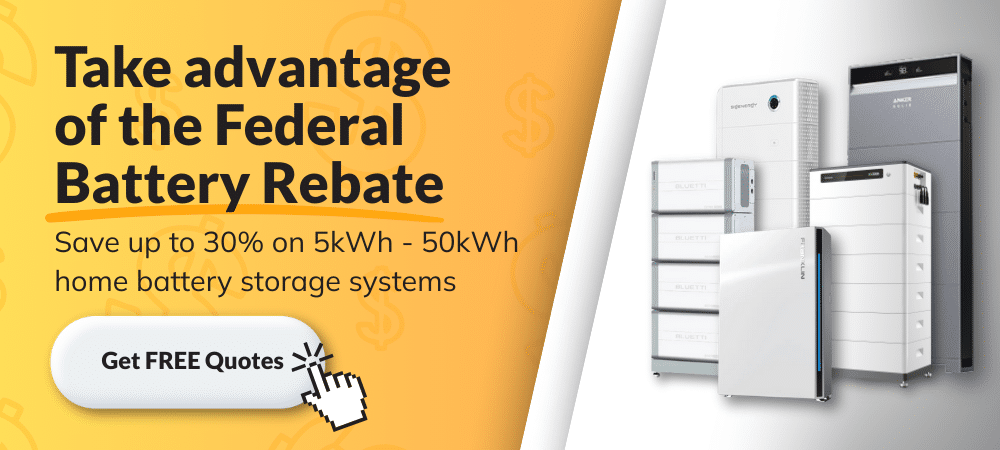The rapid growth of solar energy adoption has been a key driver in reducing greenhouse gas emissions and transitioning towards a more sustainable energy future. Solar panels, also known as photovoltaic (PV) panels, are at the forefront of this clean energy revolution. However, with the increasing deployment of solar panels, concerns have emerged regarding their end-of-life management and the environmental impact of disposing of them. To address these concerns, researchers at the University of New South Wales (UNSW) have developed an innovative and environmentally friendly solar panel recycling process that promises to recover valuable resources and reduce the ecological footprint of photovoltaic technology.
As we applaud the strides in solar technology, Energy Matters provides a practical next step. Explore the sustainable journey further by getting FREE solar quotes from them, ensuring not only a clean energy transition but also a responsible and eco-friendly approach to harnessing the power of the sun for your home.
Are you looking to save money on your electricity bills and reduce your carbon footprint? Energy Matters can help you find the perfect solar solution for your home or business. We have been recognised for our continued excellence in the Australian solar industry.
We provide our customers with high-quality resources, insight, and access to reputable solar quotes. Our team of solar experts can help you get up to 3 FREE solar quotes from pre-qualified and vetted solar firms in your area.
Can solar panels be recycled?
Yes, solar panels can be recycled. They are made up of various materials, including glass, aluminium, silicon, plastic, and copper, all of which can be recycled in existing industries. Recycling typically involves crushing, shredding, and milling the panels, then separating the different materials. The glass can be used to make new solar panels, while the aluminium can make new frames and other products. The silicon can be used to make new solar cells, and the plastic and copper can be recycled into new products.
Only a small percentage of solar panels (up to 17%) can be recycled in Australia. The most commonly recycled components are the aluminium frame and junction box. The remaining materials (glass, silicon, and polymer back sheeting) are not recyclable.
Despite the challenges, there is growing interest in solar panel recycling. The government of Victoria has banned solar panels from landfills, and other states are considering similar measures. As the demand for solar panel recycling increases, new technologies are being developed to make the process more efficient and cost-effective.
UNSW Sydney engineers develop new solar panel recycling process that recovers valuable silver
Researchers at UNSW Sydney, NSW, have developed a new, more effective way to recycle solar panels, which can efficiently recover silver. The patented process, specially created for photovoltaic panels, uses a sieving technique to quickly and efficiently sort the component materials, making it much easier to recover important elements such as silver.
UNSW's Innovative Solar Panel Recycling Process: How the process works
The process begins by crushing the solar cells into smaller particles and passing them through a vibrating container with stainless steel balls. The sieving aids help to break down the solar cells into even smaller pieces, which improves the separation of the different materials. The entire crushing and sieving process takes only 5-15 minutes and can effectively separate 99% of the PV materials.
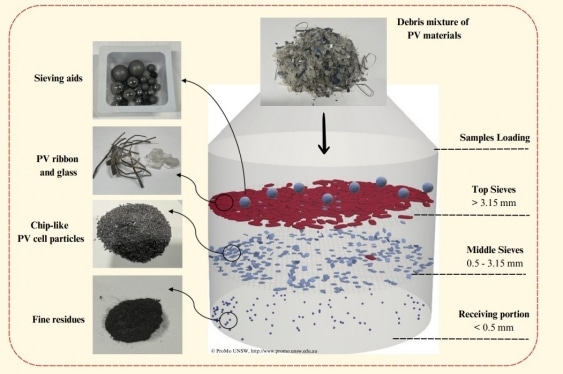
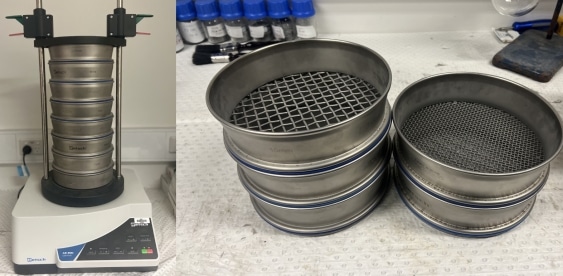
The researchers found using stainless steel balls as a sieving aid optimal. The balls can crush the solar cells without damaging the valuable metals contained within them. The separated materials can then be further processed to recover silver and other valuable metals.
Silver is a particularly valuable metal that is used in the production of solar cells. It coats the front of the solar cells to improve their efficiency. The new recycling process developed by UNSW Sydney can recover silver at high efficiency, reducing the cost of solar energy and making it more sustainable.
Source&Images: UNSW Sydney Newsroom
Other innovative approaches to solar panel recycling
Australian researchers and industries are at the forefront of developing innovative methods to recycle solar panels effectively. These methods aim to dismantle solar panels into their constituent components, recovering valuable materials for reuse in various applications.
1. Mechanical disassembly
One of the most common methods involves mechanical disassembly, where solar panels are physically broken down into smaller pieces. This process separates materials like glass, aluminium frames, and electronic components. The recovered materials can then be recycled or repurposed.
2. Thermal treatment
Thermal treatment techniques, such as pyrolysis and incineration, can extract valuable materials from solar panels. These methods involve heating the panels to high temperatures, which can break down the materials and release valuable metals and other substances.
3. Chemical recycling
Chemical recycling processes utilise chemical agents to dissolve and separate the different materials in solar panels. This method can be particularly effective for recovering high-purity silicon, which can be reused to manufacture new solar cells.
4. AI and robotic dismantling
By enabling accurate material separation during recycling procedures, advanced sorting techniques that use robots and artificial intelligence assist in overcoming these difficulties. It can segregate glass, plastic, and metal components, ensuring maximum material recovery.
Sources: Republic of Solar, Recycling Inside
Benefits of recycling solar panels for a sustainable future
- The new recycling process is environmentally friendly. It does not use harmful chemicals or solvents and produces minimal waste. This is important because solar panels comprise various materials, including some that are harmful to the environment if not disposed of properly.
- The new recycling process developed by UNSW Sydney could revolutionise the solar industry. It could reduce the cost of solar energy, make it more sustainable, and reduce the environmental impact of solar panel disposal. The researchers are working to commercialise the process and make it available worldwide to solar panel manufacturers and recycling companies.
- In addition to silver, the new recycling process developed by UNSW Sydney can also recover other valuable metals from solar panels, such as copper, tin, and lead. This could create a circular economy for solar panels, where the materials from old solar panels are used to produce new solar panels. This would help to reduce the need for mining new materials and make solar energy even more sustainable.
Eco-friendly disposal practices in Australia
Environmental impact
Recycling prevents toxic substances from entering landfills and reduces the environmental impact of solar energy systems. By recovering materials, the need for mining new resources is significantly decreased.
Economic opportunities
The growing solar recycling sector creates jobs and opens up opportunities for businesses specialising in waste management. It also supports the local economy by providing raw materials for manufacturing.
Energy conservation
Recycling materials like silicon and glass requires less energy than producing them from scratch. This contributes to a more sustainable energy cycle, aligning with Australia’s renewable energy goals.
The potential impact of the new process
The new solar panel recycling process can potentially make solar energy more sustainable and affordable. The process can reduce the cost of producing new solar panels by recovering valuable materials from old solar panels. Additionally, the process can reduce the environmental impact of solar energy by reducing the amount of waste that needs to be disposed of.
As solar energy continues to play a pivotal role in the global transition to clean and sustainable energy sources, addressing the environmental impact of solar panel disposal is paramount. The innovative solar panel recycling process developed by researchers at UNSW offers a promising solution by reducing e-waste, recovering valuable materials, and promoting a more sustainable and circular approach to solar panel production.
This breakthrough in solar panel recycling aligns with environmental goals and holds economic potential by ensuring the availability of critical materials and reducing the carbon footprint of the solar industry. As technology advances, such innovations will create a more sustainable future powered by clean energy.
Upgrade your solar system without sending your old solar panels to landfill. Second Life Solar will cover the cost of removing outdated solar panels if you decide to replace your system. Thanks to our collaborations with the CSIRO, the NSW Environment Protection Authority, and Energy Matters, we are happy to provide existing solar customers an option.
Is it worth recycling solar panels?
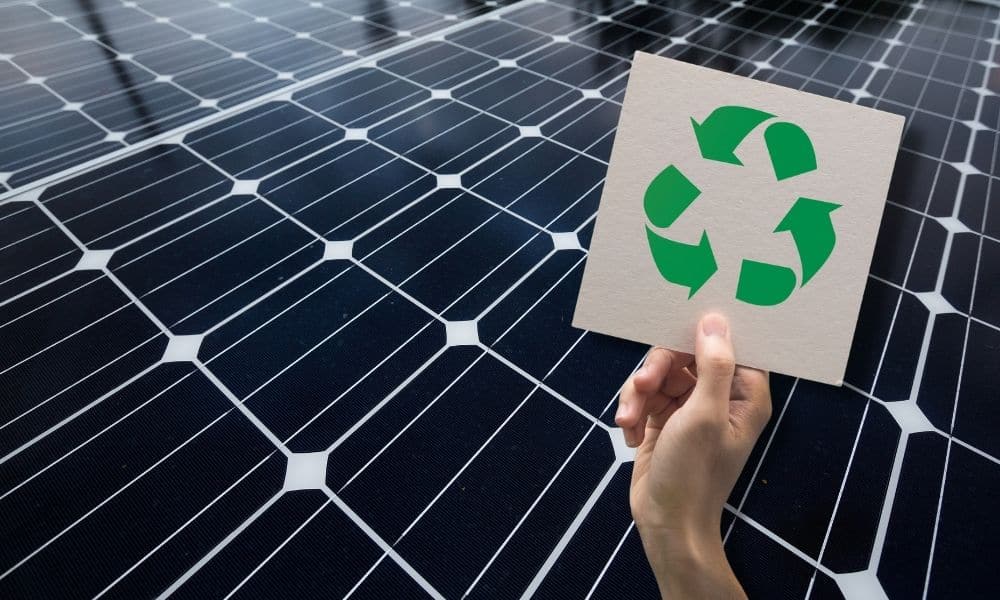
Solar panels are a sustainable source of energy, but what happens to them when they reach the end of their lifespan? Recycling solar panels is a complex process, but it is worth considering for several reasons.
- Solar panels contain valuable materials such as silicon, glass, aluminium, and copper. Recycling these materials can help reduce the need for mining and processing new raw materials, saving energy and reducing greenhouse gas emissions.
- Recycling solar panels can help to prevent toxic materials from entering the environment. Solar panels contain small amounts of lead and cadmium, which can harm human health and the environment if not disposed of properly.
- Recycling solar panels can help to create new jobs and boost the economy. As the solar industry continues to grow, the need for solar panel recycling facilities will also increase.
However, the cost of recycling a solar panel can be higher than the value of the recovered materials. Additionally, there is still a relatively small market for recycled solar materials. Despite the challenges, there is a growing movement to promote solar panel recycling.
Overall, recycling solar panels is a worthwhile endeavour that can help to reduce environmental impact, create jobs, and boost the economy. However, it is important to know the challenges involved and choose a reputable recycling facility.
How to recycle solar panels in Australia?
Depending on your state or territory, old solar panels can be disposed of in several ways in Australia.
- Victoria, South Australia, and the ACT have banned solar panels from ending up in landfill. Therefore, you must take your old panels to an e-waste collection point. These are typically located at council waste disposal facilities or recycling centres.
- You can dispose of your old solar panels in other states and territories as part of your regular hard rubbish collection. However, it is always best to check with your local council first.
- If your old solar panels are still working, you can sell them to someone who needs them. There are several online platforms where you can do this.
- You can also donate your old solar panels to a charity or community organisation that can reuse them.
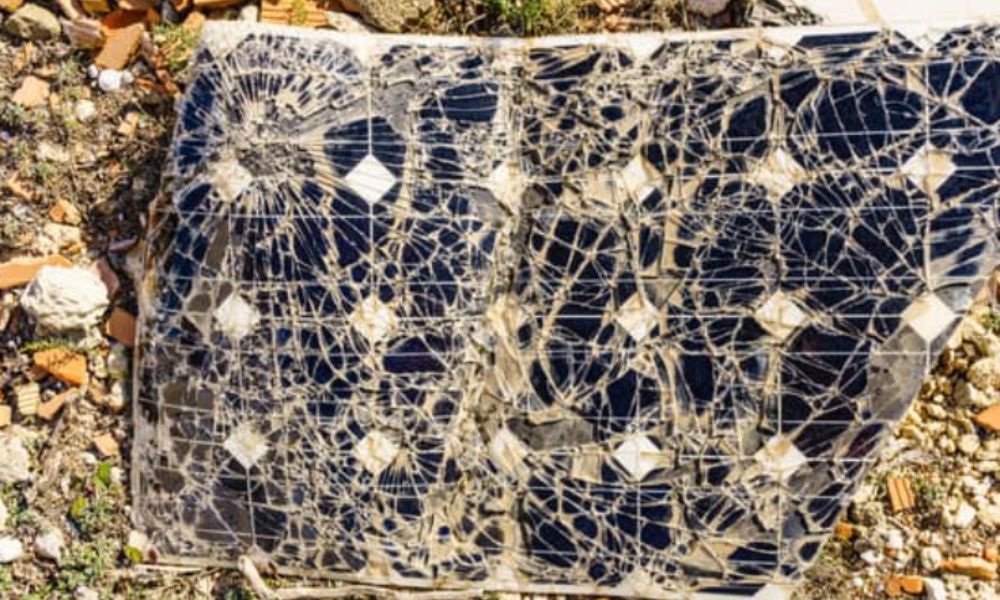
Energy Matters: Your partner in sustainable energy
Australia’s journey toward a renewable future is incomplete without sustainable practices for managing solar panel waste. By embracing innovative recycling methods, eco-friendly disposal, and the principles of a circular economy, the country can ensure that solar energy remains a truly green solution. At Energy Matters, we encourage you to explore sustainable solar solutions and take action to recycle responsibly.
Energy Matters is pleased to offer current solar consumers an alternative thanks to our partnerships with the CSIRO and the NSW Environment Protection Authority. If you upgrade your solar system, Second Life Solar will pay to remove your old panels. We can collectively contribute to a cleaner and greener planet by choosing solar energy and supporting sustainable recycling practices.










